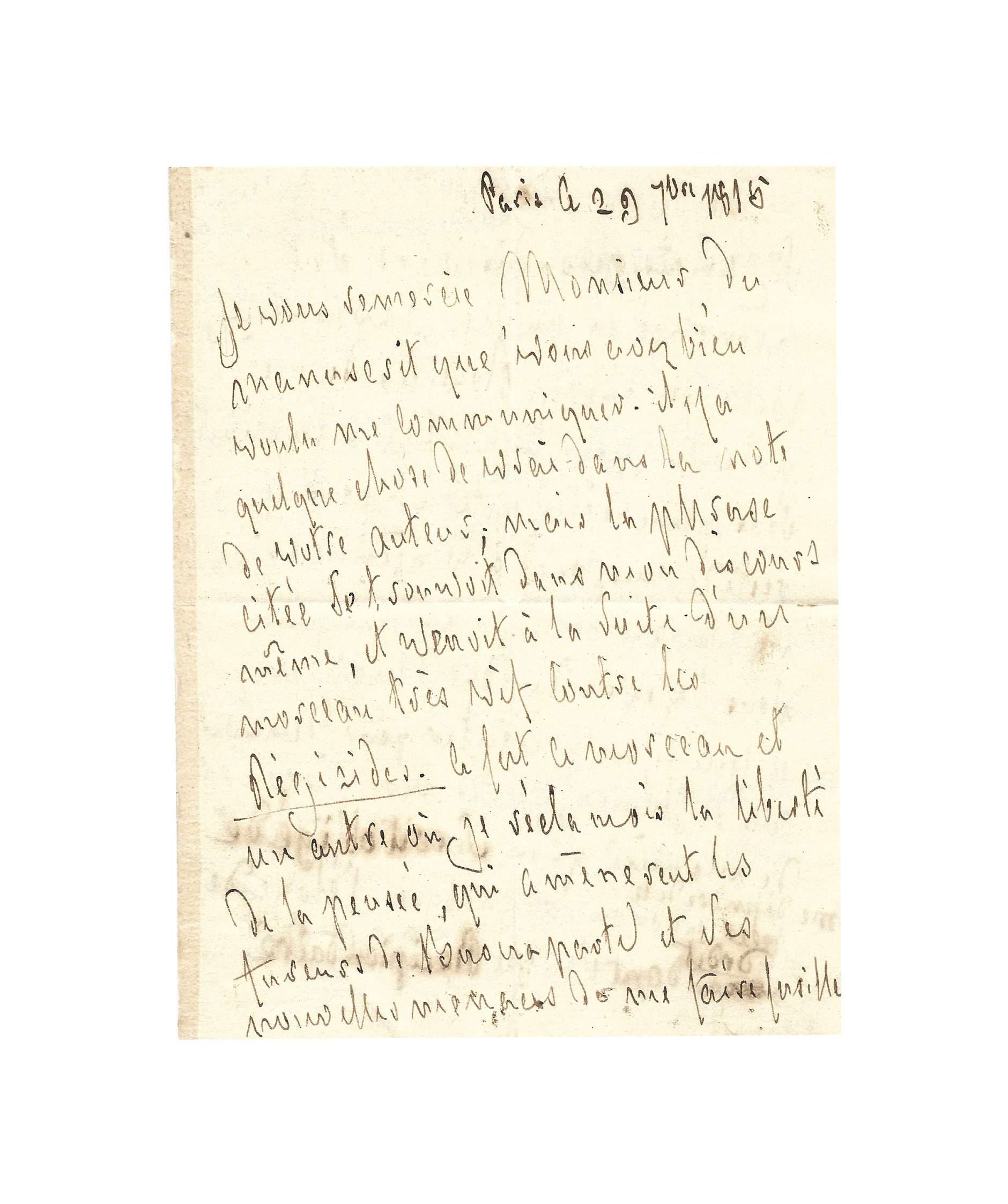CHATEAUBRIAND (de), François-René (1768-1848)
Autograph letter signed « Le Vte de Chateaubriand » to Abel
Paris, 29th 7bre [September] 1815, 4 pp. in-8°
« I demanded freedom of thought, which brought Buonaparte’s fury and his new threats to have me shot »
Fact sheet
CHATEAUBRIAND (de), François-René (1768-1848)
Autograph letter signed « Le Vte de Chateaubriand » to a gentleman
Paris, 29th 7bre [September] 1815, 4 pp. in-8
Numerous corrections by Chateaubriand on page 2 and 3
Collection stamp on fourth page, previous mounting on left margin
Exceptional letter evoking his acceptance speech at the Academy and the fury of Emperor Napoleon that it provoked
« Je vous remercie, Monsieur, du manuscrit que vous avez bien voulu me communiquer. Il y a quelque chose de vrai dans la note de votre auteur [J.E. Chetwode] ; mais la phrase citée se trouvait dans mon discours même, et venait à la suite d’un morceau très vif contre les Régicides. Ce fut un morceau et un autre, où je réclamais la liberté de la pensée, qui amenèrent les fureurs de Buonaparte et ses nouvelles menaces de me faire fusiller, si jamais mon discours était prononcé en public. J’avais reçu l’ordre du duc de Rovigo de me présenter pour candidat à l’institut, sous peine d’être enfermé pour le restant de mes jours à Vincennes.
Ne voulant occuper aucune place sous l’assassin du duc d’Enghien, et forcé de me présenter pour occuper celle de [Marie-Joseph] Chénier, je fis mon discours de manière qu’on serait obligé de me défendre de le prononcer malgré l’éloge de droit don chaque récipiendaire était obligé de couronner son discours. Je réussi dans ce dessein, mais je pensais y perdre la vie ; et l’on se rappelle tout le bruit que cette affaire de l’institut fit dans le temps à Paris.
Je pense donc Monsieur, que l’anecdote racontée par M. Chetwode étant presque entièrement controuvée, elle peut être supprimée sans inconvénients.
Pour mon compte, je désire que l’on parle de moi le moins possible. C’est à vous Monsieur, de suivre là-dessus votre sentiment ; et je vous renouvelle encore mes remerciements pour votre politesse et la délicatesse de votre procédé envers moi.
J’ai l’honneur d’être, Monsieur, votre très humble et très obéissant serviteur.
Le Vte de Chateaubriand »
Chateaubriand provides here details on his election speech at the Académie française. Marie-Joseph Chénier (brother of the poet guillotined during the Revolution) died on January 10, 1811. His death left vacant a seat at the Institute, in the “second class”, assigned to the language and “French literature”.
“Member of the Second Class” meant nothing to the public. Chateaubriand was therefore not concerned with an honor that would add nothing to his prestige. Moreover, in any case, it could not suit him to replace Chénier, for he would be forced to praise a man who had pursued Atala (Chateaubriand’s early novel), voted for the death of Louis XVI and dragged Catholicism through the mud.
The speech was read in April 1811, before the Academy, not by the author himself, as some voices had requested, but in his absence, and by one of the members of the Commission. Between praise of freedom, attacks on power, demanding the right of the writer to express himself without hindrance, the discourse takes turns of anti-empire pamphlet.
After a short debate that remained secret, a ballot was held deciding, by a majority, that the speech could not be admitted. Chateaubriand, who was waiting in a nearby room, was immediately notified of this decision. Regnaud de Saint-Jean-d’Angély, one of the emperor’s first hand acquaintances, ran to report this incident, in his eyes more political than literary. Highly irritated, and for good reason, Napoleon took to his account the entirety of the subject, therefore of the attacks. Chateaubriand was forbidden to occupy his seat; he will do so only after the Restoration.
An enmity dating from the assassination of the Duc of Enghien
The personal relations of the great writer and Napoleon Bonaparte spoiled under the Empire, His admiration for Bonaparte was total since 1800, he is even assigned first secretary of embassy in Rome. However, Chateaubriand fell into defiance as soon as the Duc of Enghien was executed in 1804. He immediately resigned and moved into opposition to the Empire.
Chateaubriand will evoke in length to these episodes in his Mémoires d’outre-tombe, volumes III and IV.
References:
Chateaubriand, Correspondance générale, éd. P. Riberette, Nrf, t. III, p. 60-61, n°729
Chateaubriand, Correspondance, éd. Thomas, t. I, p. 392-395 (n° 246aa)
Marquis de Granges de Surgères, Une gerbe de lettres inédites de Chateaubriand, Nantes et Pars, Leclerc, 1911, p. 28
